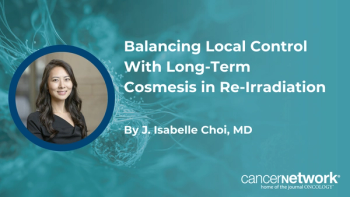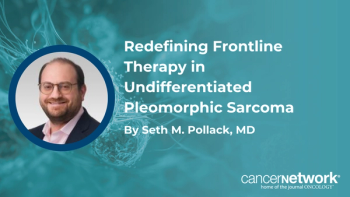
Miami Breast Cancer Conference® Abstracts Supplement
- 42nd Annual Miami Breast Cancer Conference® - Abstracts
- Volume 39
- Issue 4
- Pages: 44-45
106 Extended Adjuvant Neratinib in HER2+/HR+ Early Breast Cancer in Clinical Routine: Interim Analysis of the Multinational, Prospective, Noninterventional Study ELEANOR (N=300)
Background
Despite modern HER2-directed treatment options, relevant recurrence risk persists in patients with extensive local disease and/or lack of pathologic complete response (pCR) to neoadjuvant therapy. Neratinib is approved in Europe for extended adjuvant therapy in adult patients with HER2-positive (HER2+)/hormone receptor–positive (HR+) early breast cancer who completed adjuvant trastuzumab-based therapy less than 1 year ago. In this population, the phase 3 ExteNET study (NCT00878709) demonstrated an absolute 5.1% improvement in 5-year invasive disease-free survival (iDFS) with neratinib compared with placebo (90.8% vs 85.7%; HR, 0.58; 95% CI, 0.41-0.82). Exploratory post hoc analyses demonstrated a more pronounced benefit in patients who don’t have a pCR and/or in those completing neratinib therapy. Diarrhea was the most common adverse effect (AE) in the neratinib arm (39% grade 3 without primary diarrhea prophylaxis). ELEANOR (NCT04388384) is the first noninterventional study of the real-world use and management of neratinib given after the current adjuvant standard of care in patients with HER2+/HR+ early breast cancer in Germany, Austria, and Switzerland.
Materials and Methods
A total of 300 patients diagnosed with HER2+/HR+ early breast cancer were planned to be enrolled in accordance with the European Medicines Agency/Swissmedic product specifications. The primary objective is to assess patient adherence to neratinib (ie, ≥ 75% of prescribed treatment days). Secondary objectives focus on patient and tumor characteristics, pretreatment and neratinib treatment details, effectiveness, safety, and health-related quality of life. Results of the preplanned interim analysis based on 300 enrolled patients observed for a minimum of 3 months are reported.
Results
At the data cut-off on August 5, 2023, 286 patients qualified for the main analysis set and 288 patients for the safety analysis set, respectively. Median age at inclusion was 52.0 years, 73.4% (210/286) of patients were at increased risk of disease recurrence having AJCC stage I or higher or N+ or non-pCR after neoadjuvant treatment. Overall, 37.4% (107/286) and 31.8% (91/286) of patients received adjuvant/post-neoadjuvant trastuzumab monotherapy or trastuzumab/pertuzumab, respectively, and 22.4% (64/286) of patients received post-neoadjuvant trastuzumab-emtansine (T-DM1). In patients who had non-pCR following neoadjuvant treatment, 55.4% (62/112) received post-neoadjuvant T-DM1. Dose escalation strategy (neratinib starting dose < 240 mg) was used in 44.4% (128/288) of patients, and 86.8% (250/288) of patients received diarrhea prophylaxis. AEs were consistent with the known safety profile of neratinib with incidence of grade 3 or higher diarrhea by worst grade less common in patients starting on a lower dose of neratinib (15.6% vs 23.8%). At the time of this preplanned interim analysis with an estimated median observation time for disease-free survival of 14.0 months, 6 patients (6/286, 2.1%) had experienced a relapse and one patient died since starting neratinib treatment, resulting in a 12-month DFS rate of 97.4% (95% CI, 94.6-98.7).
Conclusion
This preplanned interim analysis provides data on the use of neratinib in a contemporary cohort of predominantly higher-risk patients and after completion of pertuzumab- and T-DM1-containing adjuvant regimens in routine clinical practice. Preliminary effectiveness data appears to be consistent with previous data and the integration of treatment management strategies such as diarrhea prophylaxis and neratinib dose escalation were shown to enhance treatment tolerability.
Articles in this issue
Newsletter
Stay up to date on recent advances in the multidisciplinary approach to cancer.












































